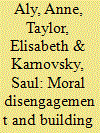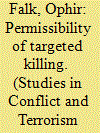| Srl | Item |
| 1 |
ID:
132178


|
|
|
|
|
| Publication |
2014.
|
| Summary/Abstract |
This article reports on the development of an education intervention, the Beyond Bali Education Resource funded by the Australian Governments' Building Community Resilience Grants of the Federal Attorney General's Department, that applies a conceptual framework grounded in moral disengagement theory. Beyond Bali is a five module program for schools that is specifically designed to build social cognitive resilience to violent extremism by engaging self-sanctions and preparing students to challenge the influence of violent extremism that can lead to moral disengagement. The theory of moral disengagement has been applied to the study of radicalization to violent extremism to explain how individuals can cognitively reconstruct the moral value of violence and carry out inhumane acts. The mechanisms of moral disengagement through which individuals justify violence, dehumanize victims, disregard the harmful consequences of violence and absolve themselves of blame have been used in the construction of violent extremist narratives. However, they have not been applied to the development of intervention strategies that aim to counter the radicalizing influences of violent extremist narratives.
|
|
|
|
|
|
|
|
|
|
|
|
|
|
|
|
| 2 |
ID:
132177


|
|
|
|
|
| Publication |
2014.
|
| Summary/Abstract |
Recent scholarship has called for additional research into the role of charismatic authority in terrorist groups and the process of radicalization. However, the sociological concepts of charisma and charismatic authority are being widely misused in terrorism studies. Current radicalization research often indirectly flirts with core concepts of charismatic authority, but fails to properly tap into its analytical utility. This article proposes to begin addressing this gap in knowledge in three ways, with: (1) a synthesis of social scientific research on charismatic authority, (2) a critical analysis of how charismatic authority is being misused and overlooked in the terrorist radicalization literature, and (3) an exploration of challenges and opportunities for future research concerning charismatic authority and terrorist radicalization.
|
|
|
|
|
|
|
|
|
|
|
|
|
|
|
|
| 3 |
ID:
132175


|
|
|
|
|
| Publication |
2014.
|
| Summary/Abstract |
Targeted killing has become an increasingly prevalent tactic employed by states in their efforts to counter terrorism. Despite its widespread use, the criteria for targeted killing permissibility have remained vague. This article identifies and evaluates the circumstances under which targeted killings can be considered permissible and looks at on-the-ground implementation by Israel and the United States. While both Israel and the United States may have largely adhered to the laws of armed conflict, in practice, discrepancies in implementation exist. This is primarily due to the ambiguity of the "distinction" and "proportionality" principles, two key legal and moral criteria that need further clarification.
|
|
|
|
|
|
|
|
|
|
|
|
|
|
|
|
| 4 |
ID:
132176


|
|
|
|
|
| Publication |
2014.
|
| Summary/Abstract |
Terrorist organizations use a proactive strategy in identifying potential candidates for recruitment. In such a strategy, miscellaneous vulnerabilities, grievances, and feeling destitute, inter alia, render certain individuals perfect candidates for terrorist organizations. It is therefore crucial to have an integrative approach to understand the interplay between the profiles of terrorists and their reasons to join terrorist groups on the one hand and processes of recruitment on the other. Proceeding from such a fulcrum, this article provides a general profile of the Kurdistan Workers' Party [PKK]/Kurdistan Communities Union [KCK] members and various recruitment techniques used by this group. To this end, records of 2,270 group members were content analyzed, in addition to face-to-face interviews with 42 group members and a range of individuals from public and private institutions. Our findings suggest that a variety of individual and organizational factors influence individual paths toward terrorism.
|
|
|
|
|
|
|
|
|
|
|
|
|
|
|
|